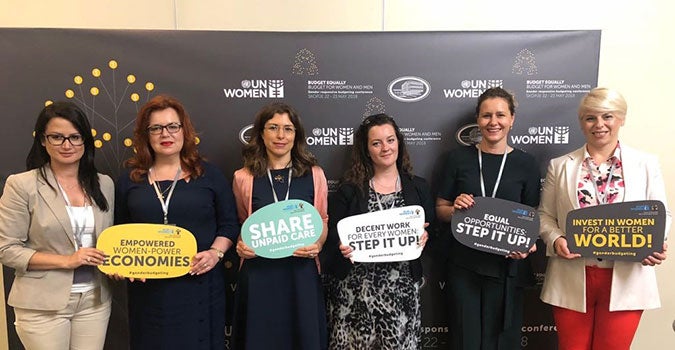
Governance and Participation in Public Life

National plans, policies and budgets are strategic opportunities for governments to turn their commitments into practical steps for achieving gender equality and the empowerment of women by 2030, a central commitment within the Sustainable Development Goals. Fulfillment of commitments to gender equality requires innovative public policy tools like gender-responsive budgeting (GRB), which comprehensively assesses gender gaps and identifies actions to close them.
GRB has been identified as key tool for advancing gender equality through government action. In this regard, Albania has taken important steps towards officially embracing gender responsive budgeting at the central and local level. However, gaps remain to ensure systematic application of GRB across all sectors of government planning and budgeting. Gender statistics and analysis needs to be improved and with more effective application of budget performance monitoring systems.
Albania has been championing gender responsive plannign budgeting over the years and has adapted its legislation and policy instruments accordingly. Existing mechanisms continue to require support to coordinate government action at central and local levels. The absorbtion of the EU gender equality acquis (i.e. the body of EU laws, rules, resolutions, declarations, regulations, directives and treaties), particularly within Local Government Units (LGUs), will also benefit from continued investments in this area.
Our solutions
UN Women in Albania is working to place gender equality at the center of planning and budgeting for national development and EU integration. We advocate for transparent and adequate public financing for gender equality, including gender-responsive budgets that channel adequate resources to both women and men.
Through UN Women support, the Government put gender equality as one of the principles of its planning and budgeting process, which over the years resulted in an increase of budget allocations for gender equality results (from just 1 percent in 2015 to 7.2 percent in 2020, of the total planned annual budget).
UN Women has a long history in mainstreaming gender responsive budgeting in Albania that contributed to a number of laws that regulate the application of GRB in medium-term and annual budget planning. Gender equality is now a core principle in the Law on Organic Budget (since 2016). In addition, the approval of law "On Local Government Finances” paved the way for GRB effective inclusion in budget programming, monitoring, reporting and evaluation.
UN Women has provided support to national and local institutions over the past years in mainstreaming gender in policy planning and budgeting. On the one hand, we implemented initiatives to enhance their capacities in analyzing, designing and executing gender-responsive plans and budgets, while on the other we provided the right tools and capacities to monitor and track budget allocations and expenditure from a gender respective. For the first time in Albania, gender expenditures can be tracked and its impact measured thanks to the improved and engendered Albanian Finance Management Information System.
At the municipal level, UN Women has helped ensure that plans and budgets respond to the needs of vulnerable women and girls and marginalized groups. Our interventions have empowered these groups to have a voice in public policy decision-making affecting their lives, and to hold decision-makers accountable for policy implementation.